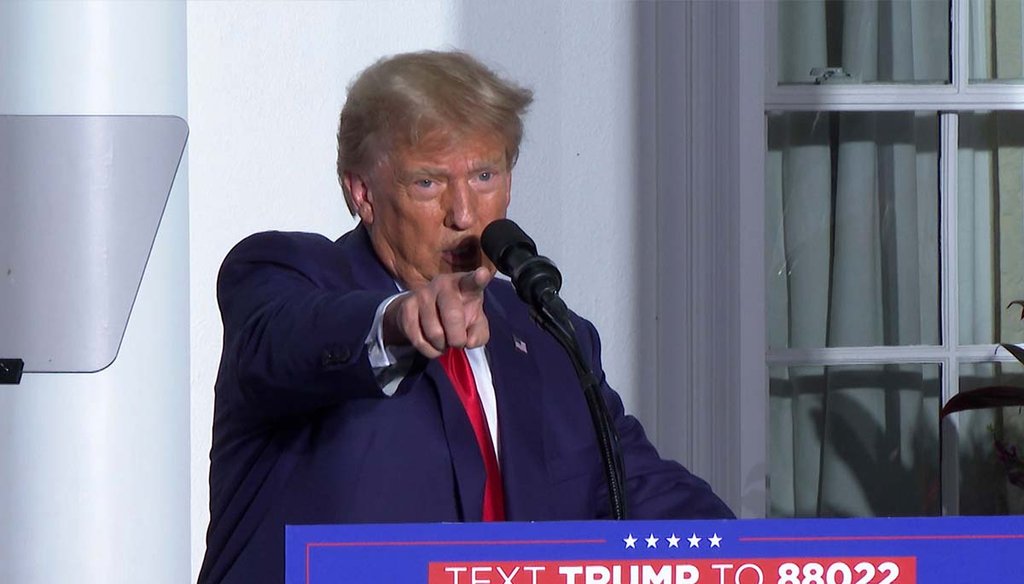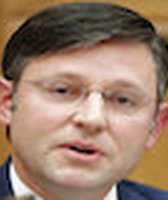Get PolitiFact in your inbox.

Former U.S. President Donald Trump speaks June 13, 2023, at his golf club in Bedminster, N.J.. (AP)
If Your Time is short
- Lawyers typically counsel their clients not to speak publicly as charges are pending against them, to avoid saying something that could weaken their legal defense. But former President Donald Trump offered his perspective on two incidents in the federal indictment against him during an interview with Fox News’ Bret Baier.
- In one exchange, Trump addresses charges that he failed to return documents at his Mar-a-Lago resort to the federal government. In another exchange, he discussed a meeting at his Bedminster, New Jersey, golf club in which he’s accused of showing a classified document to people who lacked clearance to see it.
- It’s unclear how much, if at all, these comments will undermine his legal defense at trial. But some legal experts suggest that what Trump told Baier could help the prosecution.
Lawyers typically counsel their clients not to speak publicly as charges are pending against them, to avoid saying something that could weaken their legal defense. But former President Donald Trump ignored that strategy within days of his federal indictment for classified document-related charges.
Trump’s interview with Fox News anchor Bret Baier aired in two parts on June 19 and 20.
Sitting for the interview "was almost assuredly contrary to advice of counsel," said Kendall Coffey, a former U.S. Attorney in South Florida and lawyer at Coffey Burlington.
In at least two exchanges with Baier, Trump commented about his participation in events cited in his indictment. One involved the period in which prosecutors have accused him of holding onto documents at his Mar-a-Lago resort that government officials wanted returned. The second was a meeting with a book author and others at his golf club in Bedminster, New Jersey; the indictment charges that Trump shared a classified document with several people who lacked the clearance to view it.
Mark Osler, a University of St. Thomas law professor, praised Baier’s questions and called the interview "a disaster" for Trump’s legal defense.
"Repeatedly, Trump said things that a good prosecutor will use to show he knew that he had classified documents and intended to keep them," Osler said.
Trump was charged with 31 counts of "willful retention of national defense information," which involves a provision of the Espionage Act. He was also charged with a conspiracy to obstruct justice by hiding and concealing documents, withholding a document from a grand jury, corruptly concealing a document or record from a grand jury; and concealing a document in a federal investigation.
Legal experts zeroed in on a section of the Baier interview in which Trump described what he did and thought during the Mar-a-Lago document standoff.
The indictment says Trump took troves of boxes containing hundreds of classified documents to his Mar-a-Lago resort in Palm Beach, Florida, after leaving office in January 2021. In May 2021, the National Archives and Records Administration, or NARA, requested that Trump return missing records. In January 2022, Trump returned 15 boxes containing 197 documents with classification markings. In April 2022, a grand jury demanded that Trump turn over additional documents with classification markings.
Trump’s attorney eventually searched Mar-a-Lago and found 38 documents with classification markings, which he provided to the FBI. However, during an August search of Mar-a-Lago, the FBI found around 100 more documents with classification markings that the indictment alleges Trump had directed be moved around.
In his interview with Baier, Trump essentially conceded some of the facts in the indictment while discussing his rationale for his actions:
Trump: "I want to go through the boxes and get all my personal things out. I don’t want to hand that over to NARA yet. And I was very busy, as you’ve sort of seen."
Baier: "But according to the indictment, you then tell this aide to move to other locations after telling your lawyers to say you’ve fully complied with the subpoena when you hadn’t."
Trump: "But before I send boxes over, I have to take all of my things out. These boxes were interspersed with all sorts of things."
By saying this, Trump "has put himself at the scene of both the Espionage Act and obstruction crimes, including indicating he was personally going through the boxes and suggesting he defied the government’s subpoena because he was too busy," said Bradley Moss, a Washington, D.C., attorney who specializes in national security matters.
Notably, Osler said, this discussion is "essentially handing the government proof" of Trump’s state of mind at the time, which can be hard to prove otherwise.
Another interview segment concerns a meeting Trump had at his Bedminster, New Jersey, golf club with two staff members, a book author and a publisher. The indictment says the former president held up a classified document in front of these people, who lacked the security clearance to see it. The discussion was recorded.
Here, too, Trump recounts events in a way that could weaken his defense, legal experts said.
Baier: "According to the indictment, you were here at Bedminster on July 21, 2021, after you’re no longer president, and you were recorded saying that you had a document detailing a plan of attack on another country that was prepared by the U.S. military for you when you were president. The Iran attack plan. You remember that?"
Trump: "It wasn’t a document. I had lots of paper. I had copies of newspaper articles. I had copies of magazines. I had copies of everything."
Baier: "You’re quoted on the recording saying the document was secret, adding that you could have declassified it while you were president, but quote, ‘Now I can’t, you know, this is still secret. Highly confidential.’ And the indictment says the recording and the testimony from people in the room saying you showed it to people there that day. So, you say this on tape."
Trump: "I didn’t show it. It says just the opposite. … Bret, there was no document. That was a massive amount of papers and everything else, talking about Iran and other things. And it may have been held up or may not, but that was not a document. I didn’t have a document, per se. There was nothing to declassify. These were newspaper stories, magazine stories, and articles."
As with the Mar-a-Lago documents example, Trump’s discussion with Baier about the Bedminster meeting places the former president at the scene of an event crucial to the indictment and allows prosecutors to argue that the indictment overall paints an accurate picture.
Also, Trump’s denial that the paper he was showing at Bedminster was a classified document could be used to impeach his truthfulness, if the prosecutors can present the jury with credible evidence to the contrary, such as the testimony of others who were present.
If he had skipped the interview with Baier, Trump could have saved himself from these complications for his legal defense, experts said. Instead of having to rebut off-the-cuff comments to a media interviewer, Trump’s lawyers could have offered the jury careful responses to the charges with an awareness of the full range of evidence.
Trump’s lawyers can formally ask the court to keep his remarks under wraps, although legal experts said this effort would likely fail, because prospective jurors might have seen the interview or heard about it secondhand.
"All of these comments are fair game and can be used at trial," said Joan Meyer, a former prosecutor and partner at the law firm Thompson Hine LLP.
Legal experts disagreed about how damaging Trump’s comments are to his case.
Coffey, the former South Florida prosecutor, said he didn’t see any of Trump’s comments as "fatal" to his defense.
"He seems to be saying that he took stuff in a hurry and had a lot of things mixed together," Coffey said. "The comments quoted in the indictment are certainly an issue. But his vague explanations don’t seem to make it worse."
However, Moss, the national security lawyer, said he considered Trump’s remarks important dents in the defense’s legal argument.
"Mr. Trump is doing a fantastic job of wrecking any possible factual defenses his legal team might have been able to make at trial," Moss said.
Staff Writer Amy Sherman contributed to this article.
RELATED: Fact-checking Donald Trump’s Bedminster speech following documents indictment
Our Sources
Donald Trump, interview with Fox News’ Bret Baier, June 19 and June 20, 2023
Axios, "Trump's Fox News disaster," June 21, 2023
Email interview with Joan Meyer, former prosecutor and partner at the law firm Thompson Hine LLP, June 21, 2023
Email interview with Bradley Moss, Washington, D.C., attorney who specializes in national security matters, June 21, 2023
Email interview with Kendall Coffey, former federal prosecutor in South Florida and lawyer at Coffey Burlington, June 21, 2023
Email interview with Mark Osler, law professor at the University of St. Thomas, June 21, 2023










































